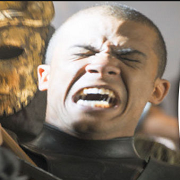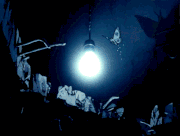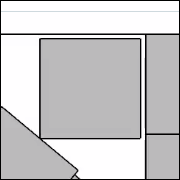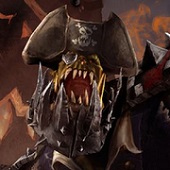|
gurragadon posted:With the deep background feature, you roll on a table for your number of siblings which gives a corresponding boost to two ability scores. You don't get to pick a free one that way unless I'm reading it wrong, which is very possible. Sorry, you're correct, I misremembered the deep background rules quote:Im really suprised that a +1 can be substantially worse too, but im glad I ended up just changed my intelligence to 18 for this run through. Is it just because of how the DC is set for enemies in this game? In Pathfinder 2e, if you beat the save DC or AC by 10, you critically succeed and similarly for failing by 10 or you critically fail. If you normally hit on a 9, then a 19 is a critical success on top of a 20. -1 not only makes you succeed less (going from 60% to 55%) but also crit less (going from 10% to 5%), and one of those two results is going to come up 10% of the time, meaning it'll probably happen at least a couple times a session if it's your main stat. Piell fucked around with this message at 17:34 on Feb 19, 2023 |
|
|
|

|
| # ? May 29, 2024 03:08 |
|
gurragadon posted:With the deep background feature, you roll on a table for your number of siblings which gives a corresponding boost to two ability scores. You don't get to pick a free one that way unless I'm reading it wrong, which is very possible. Failing attacks and sneaks and anything else because it's not like I did a big STR rogue gimmick or anything.
|
|
|
|
Piell posted:Sorry, you're correct, I misremembered the deep background rules That makes sense, so that penalty is really the most punishing by lowering the chances of critical hits? Spells don't crit the same as martial attacks though, right? Each spell has its own crit effect if it has one described in the spell. Unless once again I'm reading that wrong, the rules are a lot denser than 5e. Do critical failures on spell saves work differently or are they described in the spell as well? Harold Fjord posted:Failing attacks and sneaks and anything else because it's not like I did a big STR rogue gimmick or anything. Got you, so it's pretty noticeable to have a weaker stat when you're doing that main stuff for your class. Does your table use the secret stealth role rules or does your dungeon master show your roles? gurragadon fucked around with this message at 17:40 on Feb 19, 2023 |
|
|
|
gurragadon posted:That makes sense, so that penalty is really the most punishing by lowering the chances of critical hits? Spells don't crit the same as martial attacks though, right? Each spell has its own crit effect if it has one described in the spell. Unless once again I'm reading that wrong, the rules are a lot denser than 5e. Spells will either have the saving throw results listed in the spell itself or as "basic" Fort/Reflex/Will which is just double damage for critical failure, normal damage on a regular failure, half damage on a success, no damage on a crit success. As far as listed results, look at something like Fear, which has a Will saving throw quote:Critical Success The target is unaffected. Having a -1 DC penalty turn a crit failure into a regular failure or a success into a critical success for the enemy is a very substantial downgrade to the spell's effectiveness, on top of just turning a hit into a miss (and since you only lose 1 frightened level per turn, its more than just increasing the penalty to checks/DC) Note that this also means that buffs/penalties can make a major difference - frightened 2 means -2 to saves/AC/attacks, meaning that your allies that were landing crits 10% of the time are now doing so 20% of the time, in addition to going from 60% to 70% chance to hit
|
|
|
|
gurragadon posted:That makes sense, so that penalty is really the most punishing by lowering the chances of critical hits? Spells don't crit the same as martial attacks though, right? Each spell has its own crit effect if it has one described in the spell. Unless once again I'm reading that wrong, the rules are a lot denser than 5e. Critical failure on a basic save makes you take double damage, and degree of success matters more for a caster because you interact with all 4 of them on everything you do. A fighter doesn't care if he misses or critically misses, but spells do half damage on a successful save and 0 damage on a critical success. ETA: I've never looked at the deep background variant, but if that's what you want to do why not wait to choose a class until you know what boosts you have to work with and choose a class that you can take an 18 in? Even if you're like, really obsessed with the order of operations, you choose a class in step 5 and roll your background in step 4, you don't even allocate your boosts until step 6 so you could definitely roll your background, choose a class that a person with that background would choose because they're good at it, and then allocate your boosts accordingly. M. Night Skymall fucked around with this message at 17:54 on Feb 19, 2023 |
|
|
|
This makes sense. It's a system where the tiers of difference are significant. A player should focus on their character being effective even if they're not min/maxing, or working a deliberately flawed character concept. Or in other words: Be an active participant at the outset and embrace the strengths the rigidity of the system gives.
|
|
|
|
Thanks for your answers everyone. I didn't realize there was the "basic save" option for every spell if it wasn't listed. I still feel like wizards are pretty bad damage dealers though, am I wrong?M. Night Skymall posted:Critical failure on a basic save makes you take double damage, and degree of success matters more for a caster because you interact with all 4 of them on everything you do. A fighter doesn't care if he misses or critically misses, but spells do half damage on a successful save and 0 damage on a critical success. The order of operations doesn't really matter with my normal character creation because I roll up a random class. Our group used to roll for stats in 5e but we don't in pathfinder because it's built on the ability boosts. Its only so random though, like if my deep background gives me strength, wisdom or charisma I would pick the one that works best for the class I rolled. Thats why I'm focusing on the 16 starting ability score, because it is theoretically possible with the way I do my characters in pathfinder but a 14 starting ability score wouldn't be unless I really went out of my way to not pick my main stat. Also, from a role-playing perspective I don't like my background to play a role in what my class is. It runs into the problem of "optimal" backgrounds which I'm not interested in really.
|
|
|
|
gurragadon posted:Thanks for your answers everyone. I didn't realize there was the "basic save" option for every spell if it wasn't listed. I still feel like wizards are pretty bad damage dealers though, am I wrong? Single target direct damage is generally mediocre at best, but AoE damage is better. By definition if you're fighting a bunch of low level enemies thats worth using AoE then their saves are going to be lower, meaning they are a lot more likely to fail/crit fail and take a ton of damage, whereas when you want to use a single target damage spell its a lot more likely to be a stronger enemy that is more likely to make its save.
|
|
|
|
Got a text last night and the 14 CHA Bard is now 18 CHA. "I always play intelligent characters" was the real reason btw. That's why all the blah-blah about character motivation didn't make any sense. This guy thinks he has to be a Big Brain in every setting. I'm a little disappointed in him because all his big "explore the system" crap was just cover for him playing a high INT bard (exactly what he plays in 5e) but whatever. At least he's not playing a garbage pile. Regarding ability scores, in earlier editions of D&D they absolute were Your Genetic Potential but nowadays you should look at them as a "how your character spends their time" meter. A character can be very intelligent but if they don't spend their time being a nerd then they have a low INT stat because if you just randomly ask them a question about lore of who the 10th King of Aquilona is they don't know. So you can be a cunning person or even a smart person but one that had no access to all that stuff, if you like. Just like a nice friendly person who everybody likes but who can't consistently get other people to do what they want is....perfectly normal with a 10 CHA. For an actual example of this Robert E Howard's Conan is a very clever and cunning guy, but he doesn't know anything academic and doesn't care. He has low charisma (until he's king) because he doesn't bother to convince anyone, either through threats or kindness. He just says "I'll loving kill you if you do that" and then they usually do it and...well...you know. quote:"Surely he sees us," muttered Conan. "Why does he not charge us? He could break this window with ease." Megaman's Jockstrap fucked around with this message at 19:54 on Feb 19, 2023 |
|
|
|
Well, I mean if 10 is "average" intelligence then 18 intelligence would be somebody with superior intelligence, right? To me the stats do represent your baseline potential in stuff. Your skills are how you spend your time, like if you spent your time studying books on a million topics you would take a bunch of lore skills. Or if you spend your time picking pockets and opening locks you would take thievery. I'm not familiar with Conan besides knowing that the stories exist, but in that quote he doesn't seem cunning or clever, he seems uneducated.
|
|
|
|
Megaman's Jockstrap posted:Got a text last night and the 14 CHA Bard is now 18 CHA. "I always play intelligent characters" was the real reason btw. That's why all the blah-blah about character motivation didn't make any sense. This guy thinks he has to be a Big Brain in every setting. I'm a little disappointed in him because all his big "explore the system" crap was just cover for him playing a high INT bard (exactly what he plays in 5e) but whatever. At least he's not playing a garbage pile. That's a big reason WotC's 5e strategy was able to court every casual person who wanted to make an superhero version of their MBTI persona to play for an evening or two. Pathfinder 2e assumes you already have enough social firmament to be able to look at the whole and commit yourself to growing within a structure, and that you actually want to participate and not just show up, sip some wine, flirt with your crush, and occasionally roll a d20 when some nerd tells you to. That modality is totally valid and what 80% of all customers want to do, and Pathfinder 2e certainly allows that but it doesn't make people feel like they can. gurragadon posted:Well, I mean if 10 is "average" intelligence then 18 intelligence would be somebody with superior intelligence, right? To me the stats do represent your baseline potential in stuff. Your skills are how you spend your time, like if you spent your time studying books on a million topics you would take a bunch of lore skills. Or if you spend your time picking pockets and opening locks you would take thievery. In Pathfinder actual character investment that your character has made is determined by Feats and Skill Levels (Untrained, Trained, Expert, Legendary). quote:I'm not familiar with Conan besides knowing that the stories exist, but in that quote he doesn't seem cunning or clever, he seems uneducated. mind the walrus fucked around with this message at 20:24 on Feb 19, 2023 |
|
|
|
So Conan is somebody who lacks a certain mental discipline to learn things unless they interest him? That sounds like a character with high strength, charisma, a decent dexterity and an ok wisdom who specialized in the skills of athletics, intimidation and thievery. I don't see how I could say he has a generally high intelligence based on this description. Just because you have a lot of knowledge in one area doesn't indicate overall intelligence. Also, characters increase stats as they level up which indicates that the character spends some amount of time improving their general ability scores. If I'm trained in Lore: River Kingdoms for example, the intelligence modifier represents how good I am at mental tasks overall while the skill levels and feats indicate how much specific time I've spent studying the River Kingdoms. Or somebody with high dexterity could have spent a lot of time working on sleight of hand tricks that may make him more graceful when attempting to pick a lock, but unless the character specifically trains in lockpicking skill there not gonna be that good.
|
|
|
|
gurragadon posted:Well, I mean if 10 is "average" intelligence then 18 intelligence would be somebody with superior intelligence, right? To me the stats do represent your baseline potential in stuff. This is true when it's randomly rolled or assign and fixed in stone. Potential doesn't change. When you are choosing how you are boosting your stats every so often the game has mechanically said "this is what you're investing your time in." Now rightly you're saying "well doesn't that overlap with skills a whole lot" and the answer is yes, they've basically created nothing more than another level to the skill system. That's why ability scores are stupid. They're stupid if they're your "genetic potential" because that can't be modelled by 6 variables and is a stupid fool's errand, and they're stupid when they're "what your character is doing" because yeah we have a skill system, but oh well. We're stuck with Big Daddy D&D's shadow all over everything. Edit: I'm not going to get engaged on the argument of the nature of intelligence, because a) it's stupid to model it as one number, and b) if you've ever been traveling to a developing country, there are TONS of people you'll meet all the time who have no "the kinds of things that count as INT knowledge" because they have no access to it, but are nonetheless perfectly smart and capable people who can learn quickly and process information just fine. Predictably, we're starting to get the nerd phrenologists in this thread and I'm simply not having this conversation with you. Absolutely 100% not interested in dialoguing with the "you can't be a smart character unless you have a high INT stat" crowd. A medium-to-low INT can mean you're a regular guy who just doesn't care about knowledge, a dullard who works really hard to know what they do know, or a smart guy who is too busy working on their fighting techniques and running their local floral guild to pay attention to magical knowledge and book learnin'. These are all perfectly viable concepts. Otherwise you get nerd brain rot where you're like "nobody likes me because I didn't take high CHA" come oooooooon Megaman's Jockstrap fucked around with this message at 20:46 on Feb 19, 2023 |
|
|
|
I don't really appreciate being called a phrenologist because I'm asking questions about the intelligence stat in a TTRPG game. I never said people in a developing country couldn't have a high intelligence. Thats just stupid. A hypothetical wizard from a developing country would have a high base potential of intelligence (18) and maybe a low skill in something they wouldn't have training in by virtue of there background.
|
|
|
|
gurragadon posted:So Conan is somebody who lacks a certain mental discipline to learn things unless they interest him? That sounds like a character with high strength, charisma, a decent dexterity and an ok wisdom who specialized in the skills of athletics, intimidation and thievery. I don't see how I could say he has a generally high intelligence based on this description. Just because you have a lot of knowledge in one area doesn't indicate overall intelligence. Megaman's Jockstrap posted:Now rightly you're saying "well doesn't that overlap with skills a whole lot" and the answer is yes, they've basically created nothing more than another level to the skill system. That's why ability scores are stupid. They're stupid if they're your "genetic potential" because that can't be modelled by 6 variables and is a stupid fool's errand, and they're stupid when they're "what your character is doing" because yeah we have a skill system, but oh well. We're stuck with Big Daddy D&D's shadow all over everything. 
|
|
|
|
gurragadon posted:I don't really appreciate being called a phrenologist because I'm asking questions about the intelligence stat in a TTRPG game. I never said people in a developing country couldn't have a high intelligence. Thats just stupid. A hypothetical wizard from a developing country would have a high base potential of intelligence (18) and maybe a low skill in something they wouldn't have training in by virtue of there background. Wizards get trained by Arcana in default so this isn't possible. Pathfinder has a "key" stat system and just by picking a class you get a boost in that stat and you get to pick your boosts on some of them. How does that tie into your "potential" argument? It doesn't, because you're taking a lovely and fundamentally flawed framework from a 50 year old game and trying to bolt it on a very modern system that was forced to keep it around (mostly in name only) as a salve to grog dorks. Like, do you know what a smart orc with "High Intelligence" who doesn't want to get buff and who has no access to formal training is called? A Druid. That's what they could do so that's what they did.
|
|
|
|
Well, I started posting this morning asking if there was a major difference in starting with a 16 intelligence and an 18 intelligence as a wizard. Thats because of deep backgrounds giving the possibility of having the main stat at 16. I believe that somebodies potential to do something can change over time. Ability scores are probably a bad way to represent it your right, but that's where the game is now. I understand that it's not possible to start with a wizard without arcana, that wasn't really the point of my hypothetical. I was just trying to say that I didn't think lack of training in a skill shows lack of intelligence. I'm sorry if my point came off as unclear. Also, that's a lovely druid because they are wisdom casters.
|
|
|
|
gurragadon posted:Also, that's a lovely druid because they are wisdom casters. LOL yes I know, the point was that they got Wise instead of getting Intelligent. They're just a brainy sort that was going to pursue some sort of knowledge-based thing no matter what and that's what shapes them. Just a reminder that Medicine is a Wisdom based skill, so this guy is "smarter" than many doctors (see how stupid this is? This is what happens with Ability Scores as character definitions! They suck!)
|
|
|
|
Megaman's Jockstrap posted:Got a text last night and the 14 CHA Bard is now 18 CHA. "I always play intelligent characters" was the real reason btw. That's why all the blah-blah about character motivation didn't make any sense. This guy thinks he has to be a Big Brain in every setting. I'm a little disappointed in him because all his big "explore the system" crap was just cover for him playing a high INT bard (exactly what he plays in 5e) but whatever. At least he's not playing a garbage pile. It's good he pumped his key stat. But surely Int isn't bad on a bard? Kind of pointless in 5E, but in pathfinder that gets him extra skills and extra languages which very much feeds into the jack of all trades trope. A face having lots of languages is great. As long as it is coming at the expense of other stats rather than Charisma.
|
|
|
|
Megaman's Jockstrap posted:LOL yes I know, the point was that they got Wise instead of getting Intelligent. They're just a brainy sort that was going to pursue some sort of knowledge-based thing no matter what and that's what shapes them. Just a reminder that Medicine is a Wisdom based skill, so this guy is "smarter" than many doctors (see how stupid this is? This is what happens with Ability Scores as character definitions! They suck!) I agree that tying a skill to only one ability score is a bad idea. Medicine could use intelligence if you were trying to determine drug interactions, dexterity if you were trying to suture someone or wisdom if you were looking for traditional remedies. You could even make it a constitution check that the person drinking a potion would have to make to "keep down" the medicine. I know 5e had that as a variant rule, I'm not sure if Pathfinder does but it should, especially because they already use multiple skills for initiative. Edit: All those people doing those checks would be doctors. One is a pharmacist, one is a surgeon and one is a traditional healer so there all trained in medicine but they use different abilities to heal somebody. Thats how I see the ability scores and why they do represent things even though they are crude. Edit again: Actually, Megaman I've been rereading the conversation and I have to say that my arguments haven't been logical. By my own arguments Conan could have a high intelligence score that just wasn't being used and yet I said he couldn't. Screw it your right I think, just get rid of ability scores or if you don't keep them maxed for your level. gurragadon fucked around with this message at 21:52 on Feb 19, 2023 |
|
|
|
Facebook Aunt posted:It's good he pumped his key stat. I think this keep getting missed (and that's understandable) but he wants to cast spells a lot. As a Bard, his Charisma sets all the spell DCs and effects, not his INT. So, he was going to be a genuinely low end spellcaster who also could make an ok (16 DEX) shortbow attack. It was a bad character.
|
|
|
|
Megaman's Jockstrap posted:I think this keep getting missed (and that's understandable) but he wants to cast spells a lot. As a Bard, his Charisma sets all the spell DCs and effects, not his INT. So, he was going to be a genuinely low end spellcaster who also could make an ok (16 DEX) shortbow attack. It was a bad character. Yup a campaign designed with solutions for an INT Bard works, but if the Player or GM wants a caster Bard and that stat is low... I mean idk what that dude thought was going to happen
|
|
|
|
gurragadon posted:Edit again: Actually, Megaman I've been rereading the conversation and I have to say that my arguments haven't been logical. By my own arguments Conan could have a high intelligence score that just wasn't being used and yet I said he couldn't. It's fine. Glad to hear it. I used to think exactly how you were but as I got older and met "intelligent" people who were total doofuses, noticed the nonsensical, limiting and artificial "book learning vs real experience" WIS vs INT divide, and got boned over at tables by Attribute Fundie DMs I really turned on them. Sorry if I seemed overly hostile.
|
|
|
|
If you want to change the keying of a skill to an ability score you can at times do so using things like Natural Medicine. Ability scores are fine. if you want a system without ability scores they exist and I encourage you to try them out.
|
|
|
|
Megaman's Jockstrap posted:(see how stupid this is? This is what happens with Ability Scores as character definitions! They suck!) I mean I'd say your specific example has a lot less to do with that as opposed to the Wisdom/Intelligence divide always being a stupid concept. The distinction has always been this odd and nebulous thing that's difficult to explain. It doesn't even make sense within the game. Clerics are powerful at channeling the powers of their gods when they have a lot of... 'street smarts'? Not their force-of-will and faith in their deity? The ability score should've just been Willpower or something similar, as it is Will is the only saving throw that isn't a direct synonym for the ability score its derived from.
|
|
|
|
Vanguard Warden posted:I mean I'd say your specific example has a lot less to do with that as opposed to the Wisdom/Intelligence divide always being a stupid concept. The distinction has always been this odd and nebulous thing that's difficult to explain. "Intelligence is knowing that a tomato is a kind-of fruit. Wisdom is not putting a tomato into a fruit salad." It's never been difficult. quote:It doesn't even make sense within the game. Clerics are powerful at channeling the powers of their gods when they have a lot of... 'street smarts'? Not their force-of-will and faith in their deity? The ability score should've just been Willpower or something similar, as it is Will is the only saving throw that isn't a direct synonym for the ability score its derived from.
|
|
|
|
mind the walrus posted:Acquired knowledge versus intuition/experience. Actually, in PF2 knowing that a tomato is a fruit would probably be Nature which is Wis based, while knowing not to put it in a fruit salad would probably be Cooking Lore which uses Int.  Acquired knowledge is also what skill ranks represent already, and repairing something broken uses Int while treating someone's wounds uses Wis despite them both being the same fundamental concept applied to different subjects. It's silly, inconsistent, and none of it makes any sense. Vanguard Warden fucked around with this message at 01:12 on Feb 20, 2023 |
|
|
|
Vanguard Warden posted:Actually, in PF2 knowing that a tomato is a fruit would probably be Nature which is Wis based, while knowing not to put it in a fruit salad would probably be Cooking Lore which uses Int. pf2e is a table top role playing game. it doesn't need perfect internal consistency because abstracting concepts is good when you're not trying to be a simulation. pf2e isn't trying to be a perfect simulation of the world. abstracting concepts consolidates them and makes game play simpler, and at times things are decided for balance reasons such as to allow for a wider breadth of classes to do things like make recall knowledge rolls. no one gets confused by what "Wisdom" does. no one gets confused by adding their wisdom modifier to their perception or to their spells, past the basic game mechanics being explained to them. it isn't an actual problem for the game in any way.
|
|
|
|
Vanguard Warden posted:Actually, in PF2 knowing that a tomato is a fruit would probably be Nature which is Wis based, while knowing not to put it in a fruit salad would probably be Cooking Lore which uses Int. Pathfinder 2e, like all TTRPGs, is a Game and thus a social system where the mechanics exist to service social activity, not the other way around. Or one might even say, the difference between intellect and wisdom.
|
|
|
|
mind the walrus posted:If you can only prove your point by increasing granularity, you're not actually proving your point, especially where social systems are concerned. Have the wisdom to not post like this.
|
|
|
|
Just make a standard, properly optimized character and then claim up and down that you're a different class, a.k.a. the muscle wizard gambit. "I'm a bard!" "Oh really? What do you play?" *destroys enemy with warhammer* "Percussion."
|
|
|
|
ZenMasterBullshit posted:Have the wisdom to not post like this.
|
|
|
|
So what would be the most entertaining build for a legchair? I'm thinking lazy sorcerer with beast master free archetype.
|
|
|
|
Really there is nothing stopping you from just changing the key ability score. Rogues can change from dex to almost any other score depending on racket, there's no reason that couldn't work for some other classes. An acolyte who was hella book learned and devout (but not at all perceptive or insightful) unexpectedly gets blessed by their god to be an Int based cleric because they are a walking almanac of religious lore. He could even make his religion checks with Int because he's literally memorized the holy books and can recite them from memory. The Religious Nerd doctrine.
|
|
|
|
Harold Fjord posted:yeah knockdown is extremely strong in this game. yeah that's basically all i do as a fighter. like i've got Intimidating Strike and some other rando stuff but making an enemy prone is just SO GOOD that it feels foolish to not do it. especially now that we've got 3 people with AoO...
|
|
|
|
Are y'all sticking with trip weapons then? Or does anybody actually keep a hand 'free'?
|
|
|
|
sugar free jazz posted:no one gets confused by what "Wisdom" does. I do, because the analogies break down completely at high levels. Let's take your tomato example. High INT is "knowing that the tomato is actually a berry, it's scientific name is solanum lycopersicum, it's a distant relative of the nightshade" and high Wisdom is..."don't put them in your fruit salad, still". Like, even as a kid I noticed every "Wisdom example" was some patently obvious thing, they never gave an example of the difference between using high WIS or high INT. It's always been the case that D&D treated "synthesis of knowledge" as INT. Sherlock Holmes, despite having absolutely off-the-charts perception and intuition, was always coded as a high INT guy. The Investigator is a high INT guy who doesn't need WIS. It's just this weird dumping area for Clerics and Druids, an ability score that, once it gets high enough, nobody knows what it means other than "you have a high perception" and "you're on favorable terms with your Diety".
|
|
|
|
Rescue Toaster posted:Are y'all sticking with trip weapons then? Or does anybody actually keep a hand 'free'? I assume what is being referred to is the Knockdown feat, but trip weapons are indeed very popular. Also free hand fighters are IMO the strongest fighters, free hand feats are extremely good. Automatically making an enemy flat-footed on a successful Strike and automatic grab in a successful Strike as level 1 and 2 feats are amazing just by themselves Piell fucked around with this message at 17:53 on Feb 20, 2023 |
|
|
|
Ok, I'm still very new to pf 2e. Played about a total of 10 hrs now. I'm trying to help evangelize PF 2e for some of the groups I play 5e with, and I think I've determined (from experience and from posts) that there are a few mild trap options for classes for beginning players: Alchemist? Wizard Are there others? Also, are there recommendations I can give people, like "Yeah, maybe don't play wizard to start out, Here is the book with Oracle." The current DM for one group straight up hates PF 2e because he hated playing Alchemist so much. This was mostly due to the player experience not matching his (I think) lofty expectations. Basically, I'm just looking for a little advice on refining my (respectful) elevator pitch when people bring up issues with the game. Of course, I acknowledge not every game is for everybody. Maybe I'm thinking about this completely wrong? I'm open to any advice, really.
|
|
|
|

|
| # ? May 29, 2024 03:08 |
|
Funnily enough Oracle is the one I would add as one to avoid as a new player, some of the curses are really debilitating
|
|
|
























